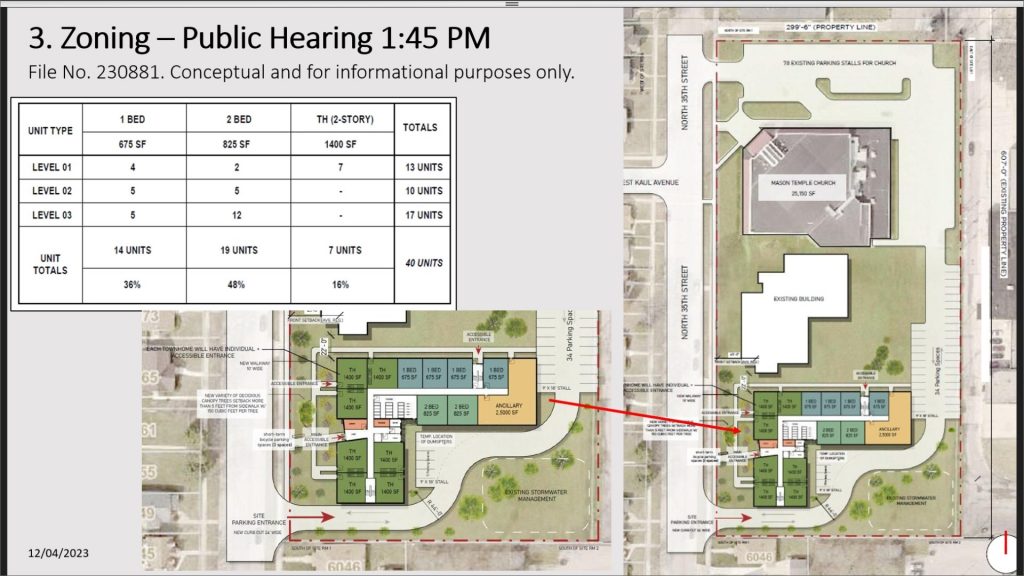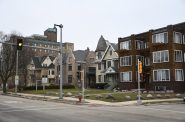Affordable Housing Planned Near Milwaukee-Glendale Border
Church would sell lot to enable development. Plus: A recap of week's real estate news.

Trinity Development Partners apartment building site. Image presented at City Plan Commission hearing.
A grass lot adjacent to a church would become an affordable apartment building under a proposal from a Georgia-based developer.
Trinity Development Partners is seeking to develop a three-story, 40-unit development on property owned by Mason Temple Church of God in Christ. The church would continue to operate in its building on the north end of the 4.18-acre property, 6090 N. 35th St., and a daycare and other tenants would continue to operate from a one-story building in the middle of the site. The property is located just west of N. Teutonia Avenue, between W. Mill Road and W. Florist Avenue.
“We have been working closely on this project for a while now, well into a two-year period,” said Trinity CEO Derrick Holland to the City Plan Commission on Dec. 4. He said the church has been at the location for approximately two decades, but it can trace its history back decades further. Mason Temple is led by pastors Sean and Osie Tatum, the latter of whom is honored with an honorary street name on N. 35th Street.
The proposal is contingent on securing competitively-awarded low-income housing tax credits from the Wisconsin Housing and Economic Development Authority. Applications are due in January, with an award announcement later in the spring.
Continuum Architects + Planners is leading the building’s design. The current floor plan calls for 38 units, including 13 one-bedroom, 18 two-bedroom and seven three-bedroom units in the building. The three-bedroom units would be designed as townhomes with their own entrances.
To enable the proposal, the development team is seeking to change the site’s zoning from RS6, a single-family designation, to RM2, which allows multi-family buildings. The Department of City Development is supporting the broad change instead of requiring a specific detailed planned development design to be created, which would lock in a specific building design. “We already had a bread-and-butter zoning district that this development could fit within,” said Department of City Development (DCD) planning manager Sam Leichtling. He noted that other apartment buildings on the block were of a similar scale.
Holland said it would “blend in appropriately.”
The development team originally pursued a larger building, but feedback from a community meeting caused a change in plans. “We went back and retooled,” said Holland of neighbor concerns. “For various reasons, we ended up with a smaller unit count.” A DCD report says that the zoning change would accommodate a 70-unit building previously discussed by the developer.
A handful of neighbors expressed concern about the parking being provided, but Leichtling said the zoning district would require a ratio of one parking space per unit.
The commission unanimously recommended approval of the zoning change. The full Common Council must still review the proposal.
The project is one of two church-land-to-affordable-housing proposals in Milwaukee vying for the housing tax credits. The commission also endorsed a proposal for a church parking lot at N. 8th and W. Chambers streets to be redeveloped into 50 senior-targeted affordable apartments.
Weekly Recap
County Would Fund Three Suburban Affordable Housing Developments
The Milwaukee County Board’s Committee on Finance provided a critical first approval to funding for three affordable housing projects in county suburbs.
The proposal would have the county support developments in Whitefish Bay, South Milwaukee and Brown Deer. The county would contribute a total of $6.6 million to the projects, which will yield a combined 133 units of affordable housing, as Urban Milwaukee has previously reported.
The county’s Housing Division plans to fund these projects, in part, using money the county already set aside for suburban affordable housing projects. In 2022, county officials earmarked $15 million in federal funding from the American Rescue Plan Act (ARPA) to support the county’s effort to tackle segregation and to achieve equity in Milwaukee County.
Historically, many suburban communities have been resistant to affordable housing projects. If the board agrees to fund the projects, the county will have supported projects in five suburban municipalities.
Proposal Would Subject School Construction To Competitive Bidding
School districts in Wisconsin would have to comply with competitive bidding requirements for construction projects costing more than $150,000 under a new legislative proposal.
Wisconsin is one of only three states that allows a project of any size to be awarded on a no-bid basis, according to data from the National Conference of State Legislatures.
Municipalities, meanwhile, have to seek a competitive bid for any project over $25,000. The same proposed legislation would increase that threshold for municipalities to $50,000.
During a public hearing Thursday before the Assembly Committee on Local Government, Chris Kulow, government relations director for the Wisconsin Association of School Boards, testified against the bill. He argued that requiring a competitive bidding process would take away local control.
Bucks Player Sells Brady Street Building
A real estate firm led by Milwaukee Bucks player Pat Connaughton has sold a two-story building on E. Brady Street that it developed during the pandemic.
The building, formally addressed as 1697-1699 N. Marshall St., will soon be home to Sip & Purr Cafe. According to state real estate transfer records, an entity affiliated with Sip & Purr owner Katy McHugh purchased the property for $1.25 million.
McHugh previously disclosed her intention to move the cat cafe from its current home on E. Ivanhoe Place near E. North Avenue to the building.
The building was completed in 2022. It includes a first-floor commercial space and an apartment upstairs. The development, which required Historic Preservation Commission approval, was recognized with a 2023 Mayor’s Design Award. Patera led the building’s design.
Property Taxes In Wisconsin Rising
Overall property taxes in Wisconsin are expected to climb by the largest amount since 2007, despite increased state funding for local governments.
That’s according to a new report from the Wisconsin Policy Forum. It analyzed confirmed property taxes from school districts, technical colleges and county governments, along with Legislative Fiscal Bureau projections for municipalities.
While gross local property taxes are anticipated to rise by 4.7 percent — the most since 2007 — the state budget boosted two tax credits that will help offset the increase, the report said. That includes increasing the school levy tax credit by $255 million and the state lottery tax credit by $15.9 million.
Ari Brown, a researcher for Wisconsin Policy Forum and the report’s author, said those credits will help keep property taxes in-line with pre-pandemic increases, while also boosting revenue for local governments and schools.
Crowley Backs More Suburban Affordable Housing
The Milwaukee County Housing Division is planning to invest approximately $6.6 million in additional suburban affordable housing projects.
Milwaukee County policymakers created a fund for suburban affordable housing in 2022 using approximately $15 million in federal funding received through the American Rescue Plan Act (ARPA). Historically, the county’s suburban communities have been averse to affordable housing projects. Housing officials are hoping to fund three projects in Whitefish Bay, Brown Deer and South Milwaukee, respectively.
“The production of additional rental homes is an economic mobility tool to allow families from diverse backgrounds to find homes in any Milwaukee County community they choose,” Housing Division Administrator James Mathy wrote in a report headed for the Milwaukee County Board of Supervisors.
In March, County Executive David Crowley signed off on the first round of contracts for affordable projects using the new fund. To date, the county has awarded approximately 80% of the fund. The housing division plans to use the remainder of the original $15 million and pair it with federal Home Investment Partnership Program (HOME) funds for the latest round of financial support.
Supervisors Back Grant for Abandoned Building Redevelopment
Milwaukee County supervisors provided the first approval needed to help solicit state grant funding for an affordable housing project on W. State Street in the City of Milwaukee.
Watersview Investment Group, led by Jason Waters, is working on redeveloping a vacant, dilapidated building at 2627-2631 W. State St. into a mixed-use building with six apartments above a first-floor commercial space.
Supervisors on the board’s Committee on Community, Environment and Economic Development considered whether or not the county should sponsor the project in an application for the Community Development Investment Program (CDIG) run by the state’s Wisconsin Economic Development Corporation. Watersview is after a $250,000 CDIG grant for the $1.1 million redevelopment.
“We’ve applied for this a couple times in the past to help support other similar projects,” said Heather Reidl, contracts manager for the county’s Economic Development Division. “It’s meant for urban projects, especially ones that involve the redevelopment of a currently unused vacant or underutilized property. In this case, it is a mixed-use development property that had been abandoned for 20 years and is out of repair and in no way useful right now.”
Foxconn Will Get State Subsidy For 2022
Foxconn has qualified for a third round of state subsidies for its development in Mount Pleasant, bringing the total amount it’s been approved to receive up to nearly $44 million.
Last month, Foxconn was given notice it would receive a little more than $6.3 million in state tax credits for the 2022 fiscal year, down about $2.3 million from the previous year, according to documents obtained through an open records request. That $6.3 million is broken down into roughly $4.1 million for job creation and about $2.2 million for capital investment.
By the end of 2022, documents show Foxconn had created 1,029 jobs, up from 768 jobs in 2021. It also invested about $26 million in buildings and equipment last year.
In a statement, Foxconn Technology Group said the company remains “committed to Wisconsin” and plans to continue growing in the state. As of 2023, Foxconn says it has spent over $1 billion in Wisconsin, and one-fifth of its U.S. workforce is located in the state.
If you think stories like this are important, become a member of Urban Milwaukee and help support real, independent journalism. Plus you get some cool added benefits.
Plats and Parcels
-
New Third Ward Tower Will Be Milwaukee’s Priciest
 Mar 3rd, 2024 by Jeramey Jannene
Mar 3rd, 2024 by Jeramey Jannene
-
New Corporate Headquarters, 130 Jobs For Downtown
 Feb 25th, 2024 by Jeramey Jannene
Feb 25th, 2024 by Jeramey Jannene
-
A Four-Way Preservation Fight Over Wisconsin Avenue
 Feb 18th, 2024 by Jeramey Jannene
Feb 18th, 2024 by Jeramey Jannene





















